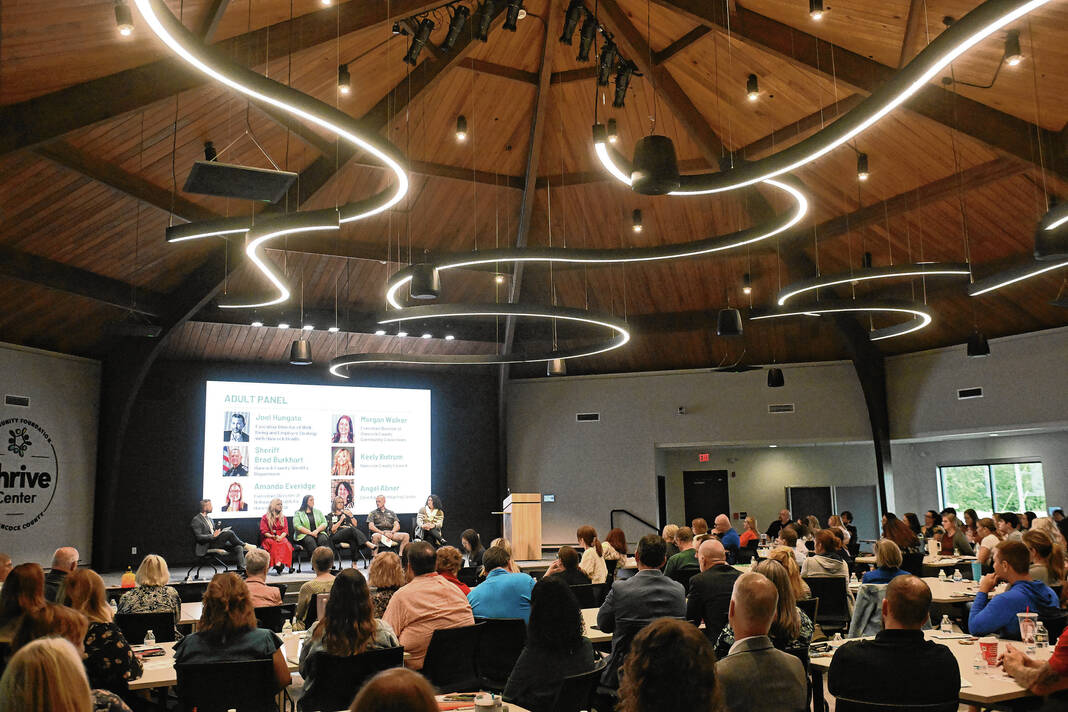GREENFIELD – A bevy of local and state leaders gathered Tuesday to discuss the state of mental health and related services in Hancock County.
Lt. Gov. Suzanne Crouch and Sen. Mike Crider shared the stage with local leaders in healthcare, government, corrections and education for the two-hour conversation held at the Thrive Center in Greenfield.
Crouch, who shared a bit of her own family’s journey with mental illness and addiction, praised the community for the strong showing of support in the packed conference center.
After attending mental health summits in Indianapolis, Crouch said she and Crider wanted to bring the conversation to other communities around the state.
Greenfield Mayor Guy Titus along with Lt. Governor Suzanne Crouch and local experts attend a mental health summit at the Thrive Center. Tuesday, October. 2, 2024. Tom Russo | Daily Reporter
“We have done a number of these all over Indiana and this is by far the largest and most engaged group of people that I have encountered, and I think that speaks to the leadership you have here. It’s an honor to be here with you all,” she said.
The event was broken down into three panel discussions with experts from various fields.
“I am amazed as I look out at this crowd that there are people from every facet and every corner of this county,” said one of the moderators, Steve Long, president of Hancock Health.
Those in attendance all shared that the state of mental health needs in Hancock County are at critical levels, and that more funding, resources and awareness is needed to address those needs.
Tondra Crum-Worley, clinical manager for Hancock Counseling & Psychiatric Services, said she’s seeing more children in mental health crises than ever before.
“I’ve been in this field for a long time and we have seen drastic increases in anxiety and depression, suicidal ideation, suicide attempts and completed suicides … and we’re seeing it at younger and younger ages,” she shared.
“One of the biggest things I’m seeing in our office is that we’re now having 8 and 10-year-olds with extreme anger outbursts. We’re seeing 10-year-olds with complete plans to commit suicide,” she said.
Oftentimes the children lack adequate support systems, she shared, whether that’s through family, mental health professionals or the community as a whole.
“Parents are struggling with their own mental health, which is why our young people are struggling, to be honest,” added Linda Ostewig, executive director of The Landing Place in Greenfield, a gathering place for teens.
Crum-Worley said it’s becoming increasingly difficult to find enough therapists to work with the growing number of people of all ages seeking treatment. “There are fewer therapists available who are willing to work with the really complicated cases, we’re seeing less and less reimbursements from insurance and the costs keep going up,” she said.
 Local and state experts, Joel Hungate, Keely Butrum, Morgan Walker, Amanda Everidge, Sheriff Brad Burkhart and Angel Abner gathered for a mental health summit at the Thrive Center. Tuesday, October. 2, 2024. Tom Russo | Daily Reporter
Local and state experts, Joel Hungate, Keely Butrum, Morgan Walker, Amanda Everidge, Sheriff Brad Burkhart and Angel Abner gathered for a mental health summit at the Thrive Center. Tuesday, October. 2, 2024. Tom Russo | Daily Reporter
‘Skyrocketing’ issues
Ostewig said she’s seen a rise in mental health challenges among the youth served by her organization, which provides support for mental health and addiction issues, among other things.
“Since COVID in 2020 we have I’d say a whole new group of youth who don’t know how to socialize. Our kids who come in now don’t even know how to communicate clearly. The anxiety and depression levels that we see have skyrocketed,” she said.
Many times a parent has been called to The Landing to take a suicidal child straight to the hospital for treatment.
Many don’t have a strong support system in place at home, said Ostewig, while others are relying on an overworked parent who is struggling with their own mental health.
Joshua Sipes, Hancock County’s chief probation officer, painted an equally grim picture of the struggles facing today’s youth.
“There’s not a substance in our community that adults are using that children are not using,” he said. “Whether it’s heroin, fentanyl, meth, spice, bath salts, our kids are using them and it’s becoming increasingly easier for them to get.”
Hancock County Sheriff Brad Burkhart said addiction has the capacity to ruin lives for both children and adults, but added that simply throwing users in jail is not the answer.
“We cannot arrest the addiction out of people,” he said, adding that the county jail has unwittingly become “the biggest mental health facility in the county.”
Both he and Keely Butrum, a Hancock County councilwoman and recovering alcoholic, advocated for more programming designed to help lift people up out of the throes of addiction.
“We have to find more funding. Without funding it can’t be done,” said Butrum, who chairs the board at the Talitha Koum Women’s Recovery House in Greenfield.
“In the years to come, if we want to see progress, we need to determine how high (mental health) is on our priority list and what sacrifices we are willing to make to get that done,” she said.
No escape
Panelists also weighed in on the potentially harmful effects social media and cell phone use can have on mental health.
“We’re living in a generation of so much connection but no connection at the same time,” said Krista Weber, a behavior specialist for the Mt. Vernon Community Schools.
“Bullying is not new, but what is new is that you cannot escape it. Whether it’s bullying, gossip, rumors – any of the things that are done on phones, you can’t escape it now,” Weber continued.
“It used to happen on playgrounds or at the bus stop, but now it’s going into kids’ bedrooms with them and it is largely unpoliced … We are essentially inviting a lot of other people’s voices into the lives of our kids and into their minds, and a lot of that is passing through their phones,” she said.
While some panelists suggested that it’s next to impossible to stay fully engaged with children’s phone and online communication habits, they agreed that it’s parents’ responsibility to do all they can to keep their children safe.
“There’s a lot of good with technology but there’s a lot of bad,” said Crum-Worley.
“With more demands on our time, a lot of times we adults put a phone in front of kids to keep them occupied so we can take care of what needs to be done, but one of the things I talk about with a ton of parents is that handing over that phone needs to be done as a teaching moment,” she said.
“We don’t hand keys to kids when they’re 16 and expect them to go out and drive. We should not be handing kids a phone or an iPad and not teaching them how to use it,” she continued.
While it can be tough navigating all the tech and apps that are constantly evolving, it’s essentially to check on children’s devices and communicate constantly about using technology safely, she said.
It’s also essentially to routinely check in on your loved ones, several panelists shared.
Close to home
Crouch shared that her own mother and brother struggled their whole lives with depression, and that her younger sister died on her third suicide attempt. Crouch also celebrated the fact that her only daughter, who is bipolar, was celebrating her 17th anniversary of sobriety on Wednesday this week.
It’s her family’s personal struggles that led her to become an outspoken advocate for mental health, she said.
Of all the things she’s accomplished throughout the past eight years as lieutenant governor, founding and chairing the Indiana Mental Health Roundtable in 2021 is among the things she’s most proud of, she said.
She did so to help community partners move towards the goal of “making sure that every Hoosier has the opportunity to be healthy, happy and prosperous,” Crouch shared.
“We know that we still have work to do. We need more financial resources in order to complete that work, but we’re on a good path, and I think that as a legislator I’m extremely of what’s within the court system, the criminal justice system, and the work that’s happening within the healthcare system in your local community,” she told the crowd Tuesday.
If anything, she thinks the collective mental health crisis that resulted from the COVID pandemic has taught society the importance of mental health support for all people.
“So today there’s more of an understanding that it’s OK not to be OK all the time, and we need to do something about it. That is what has led us to what is going on in the state of Indiana today, and what is going on nationally, and you are blessed to have such leadership here that is really moving this issue forward,” Crouch shared.
She encouraged those gathered to reach out to state and local lawmakers to advocate for resources to support and expand mental health and addiction programs throughout the state.
“We also have to engage the private sector, (because) only 1.8 percent of philanthropic giving goes to mental health … so we’ve got to do a better job,” said Crouch.
“We all have to be engaged, each and every one of us … to continue to be loud and proud about putting resources into mental health and addiction,” she said.
To learn more about the Indiana Mental Health Roundtable, visit mentalhealthroundtable.org.
To get connected with local resources for mental health and addiction, visit hancockhealth.org/wellness-education/connection-center.





